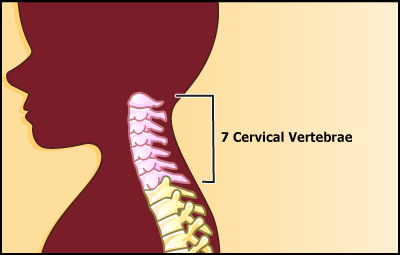X-Ray Exam: Cervical Spine
What's an X-Ray?
An X-ray is a safe and painless test that uses a small amount of radiation to make an image of bones, organs, and other parts of the body.
The X-ray image is black and white. Dense body parts, such as bones, block the passage of the X-ray beam through the body. These look white on the X-ray image. Softer body tissues, such as the skin and muscles, allow the X-ray beams to pass through them. They look darker on the image.
X-rays are commonly done in doctors’ offices, radiology departments, imaging centers, and dentists’ offices.
What's a Cervical Spine X-Ray?
In a cervical (SER-vih-kul) spine X-ray, an X-ray machine sends a beam of radiation through the neck, and an image is recorded on special film or a computer. This image includes the seven vertebrae in the neck area, the first vertebrae of the thoracic spine, and the disk spaces between them.

An X-ray technician will take pictures of the spine:
- from the front (AP or anterior-posterior view)
- from the side (lateral view)
- from the front through an open mouth (odontoid view)
Occasionally, other pictures (like flexion and extension views) also might be done.
Cervical spine X-rays are done with the person lying down. They should stay still for 2–3 seconds while each X-ray is taken so the images are clear. If an image is blurred, the X-ray technician might take another one.
If the person might have a neck injury, a collar or brace will be placed around the neck to limit movement and help prevent further injury.
Why Are Cervical Spine X-Rays Done?
A cervical spine X-ray can help doctors find the cause of neck, shoulder, upper back, or arm pain, as well as tingling, numbness, or weakness in the arm or hand. It can show fractures (breaks) in the cervical vertebrae or dislocation of the joints between the vertebrae.
Cervical spine X-rays are often done after someone injured their head, neck, or back in an automobile or other accident, especially if they are unconscious or can't describe symptoms for other reasons.
An X-ray can help doctors plan surgery, when needed, and check the results after it. It also can give clues about an infection, tumor, or other problems in the neck bones.
What if I Have Questions?
If you have questions about the cervical spine X-ray or what the results mean, talk to your doctor.


